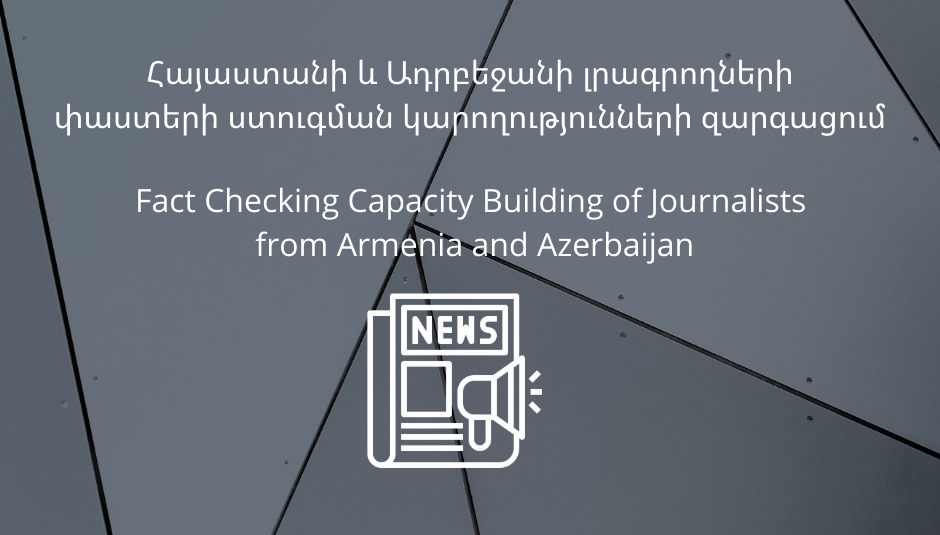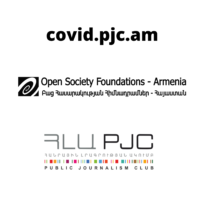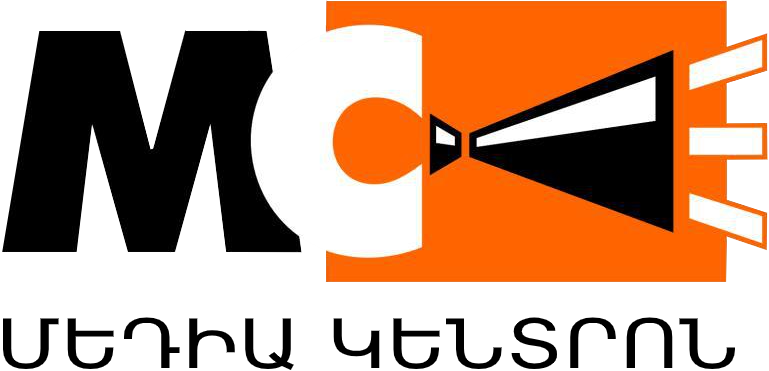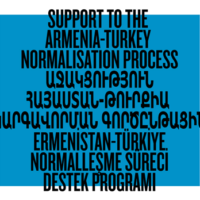
“Fact-Checking and Verification: Basic Principles, Methodology and Goals”
- August 24, 2020
- Category: News
 “Fact-Checking Capacity Building of Journalists from Armenia and Azerbaijan” Project
“Fact-Checking Capacity Building of Journalists from Armenia and Azerbaijan” Project
“Fact-Checking and Verification: Basic Principles, Methodology and Goals”
Series of Webinars
Press Release
The Public Journalism Club NGO in partnership with Georgian Go-Group Media launched series of webinars entitled “Fact-Checking and Verification: Basic Principles, Methodology and Goals” in the framework of the “Fact-Checking Capacity Building of Journalists from Armenia and Azerbaijan” project which was made possible with the support of the U.S. Embassy in Armenia.
The project aims to establish a network of media representatives, journalists, and civil society members from Armenia and Azerbaijan, who will develop capacities on fact-checking, go through regional workshops, and establish professional ties with each other.
Overall five webinars have been organized, starting on June 13, 2020.
The topics of webinars included the following topics:
- Fact-checking and verification – basic principles, methodology and objectives
- Sources of information and public data for fact-checking
- Verification of texts, publications in the media and public statements of politicians
- Image Authentication and Relevance
- Video Authentication and Relevance
The trainer of the webinars Oleg Khomenok who is a member of GIJN’s Board of Directors, and a Senior Media Adviser at Internews Network, emphasizing the importance of the project and the efficiency of the webinars, said: “We live in an age of rapidly changing media production and consumption, and disinformation is growing and affecting the ability of the audience to make conscious decisions. New skills of fact-checking and verification of the information becomes a “must-have” for any reporter.
These webinars, organized by Public Journalism Club, gathered reporters from Armenia and Azerbaijan, not only to learn how to define disinformation, but also to find common story ideas that will be interesting to both countries’ media and will be produced using fact-checking techniques that participants learned during the course. I believe the participants will use their skill to produce high-quality verified content.”
Aliya Hakverdi, a journalist from Azerbaijan and the editor of the “Jam News” platform in Azerbaijan, also highlights the importance of such projects: “These webinars were useful both for participants who had no experience at all and for those who work with fact-checking every day. The group members shared useful information with each other. For me as a whole, these webinars are a great start to collaborating with a group of journalists, with different backgrounds who can learn from each other a lot.”
Twelve journalists participated in the webinars – six from Armenia and six from Azerbaijan. During the webinars, the participants were not only passive listeners but also active participants. Examples of misinformation related to the region or specific countries were discussed.
At the end of the webinars, the participants filled out evaluation sheets. Summarizing their thoughts and assessments, it can be concluded that the webinars were effective and interesting.
Participants particularly emphasized the need for tools for image authentication and relevance. A participant from Armenia mentioned: “The information provided during the webinars is the most up-to-date in the media field. I have learned about various fact-checking tools that I am sure will be useful in my future journalism career. Now I know exactly what information can be checked and what not. The webinars gave me new ideas, helped to strengthen my analytical skills.”
One of the participants of Azerbaijan noted: “Even though I knew many fact-checking tools, there were disclosures for me. I will use the new fact-checking tools in my future journalistic activities.”
In addition to the presentations and theoretical materials presented by the expert, practical exercises were an integral part of webinars and also useful materials were obtained such as a catalogue of public data of Azerbaijan and Armenia.
Applying the knowledge and skills gained as a result of the webinars, the participants will work on articles on the topics discussed and agreed on in advance. The materials will be published on the Jam News website.
The next phase of the program will be planned based on the situation created by the Covid – 19 pandemic. If it is not possible to conduct trainings, the capacity building will continue online.
By the end of the program, it is planned to have 20 articles written by webinar participants.
If you have any questions about the program, please, call 012 755 898 or write to [email protected].





